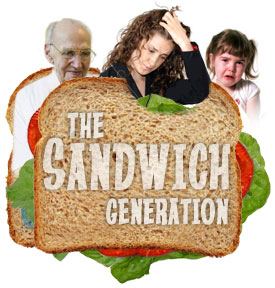I became a new parent twice last year for the first time. So did I defy nature and give birth two times in one year? No. I officially became a parent for the first time to my darling 9 year-old twin stepsons when I married the love of my life; and a second time when I had to move my father closer to me and become his primary caregiver due to early onset Alzheimer’s Disease.
 This phenomenon of individuals becoming parents to young children later in life while also transitioning to parenting their parents has been called the “Generational Squeeze” or the “Sandwich Generation.”
This phenomenon of individuals becoming parents to young children later in life while also transitioning to parenting their parents has been called the “Generational Squeeze” or the “Sandwich Generation.”What does that mean for those of us who have found ourselves as deli meats between two very different slices of bread? If I’m tuna fish, how can I provide the most delectable experience if I’m accompany a slice of marble rye on one end and half a toasted asiago bagel on the other and try not to turn into a stinky mess?
And more how-can-I’s …
- get in a 3-mile run
- make pancakes and bacon for the boys before school
- talk with my dad and reassure him that it wasn’t today I was coming for a visit but tomorrow
- put in an 8-10 hour day at the office
- talk with my dad and again swear to him that it really isn’t tomorrow yet
- run to the drugstore because my dad needs mouthwash and a candy bar
- answer his third phone call to reassure him that he really did want me to keep his Discover Card for him and that he didn’t lose it
- go home and fix a nutritious dinner
- feed the cats, walk the dog
- play UNO with the boys
- hold an intelligent conversation with my husband
- break up the incessant arguments that twin brothers seem destined to have about who knocked over the LEGO tower
- pay bills
- field calls number 4 and 5 from dad promising that I’ll bring him his checkbook next time I see him so he can write a check to the starving kids in Ethiopia (NOT!)
- get to bed by 9 pm (yeah right) so I can start over and do it all again
According to the American Psychological Association’s (APA) 2007 Stress in America report, women (specifically, mothers) in the 35-54 age range experience the greatest stress compared to any other age group. The Alzheimer’s Association (2000) estimates that 5.75 million Americans are in the “Sandwich Generation” of caring for both children and parents, and women represent the majority of caregivers for family members.
So how we do to alleviate the stress that comes from the squeeze between generations? None of us want to become rotten, stinky tuna, right? Thankfully, there are many great resources out there (APA, Alzheimer’s Association, Caregiver.com, for example). Here are three strategies:
- Ask for help and be specific. We all want to believe we can do it all, but let’s be real … we can’t. Use your planning and delegation skills that you use at the office to pull family members, friends and church folks into your life for help. Don’t say, “anything you can do would be great.” Tell people exactly what you need. Ask your husband to plan evening meals with you and be responsible for 1-2 of them each week. Talk with your church family and ask for someone to stop by and visit with your aging parent so their socialization is not 100% dependent on you.
- Take care of you first. Cliché, right? “You can’t be any good for anyone else if you don’t take care of you first.” But it’s so true. You’re not being selfish. It’s easy to give up those early morning walks, once-in-a-while massages or healthy meals in lieu of fast-food, in the name of saving time. Are those really the things to give up, especially for those of us who are not exactly spring chickens? This has honestly been difficult to consistently implement. I’ve paid for it with waning energy levels, non-restorative sleep, recurrent illness, weight gain. Remember that the younger generation you’re taking care of is watching every move … so it’s good for them to see you prioritize and take care of yourself. It’s an exercise in building your and their sense of self-worth.
- Accept that you can’t be everything to everyone and be in the moment. Mothers worry. I was already a natural-born worrier before becoming a “sandwich mommy. It’s hard to remain present with my dad when his reality is shifting daily as short-term memories leave him and he fights to maintain that sense of who he was and is. It’s easier to let my mind wander to all the other responsibilities that I need to be taking care of. But when I refuse to let all those other distractions in and allow myself to just be with my dad, this incredible sense of peace washes over me. I can’t be with my dad every hour of every day but I can be in the moment with him, whenever those moments occur. It’s the quality, not the quantity. Worrying is a waste of precious energy.






Leave A Comment
You must be logged in to post a comment.